Guiding the guides – ten years in field guide training Q&A with Ben Coley
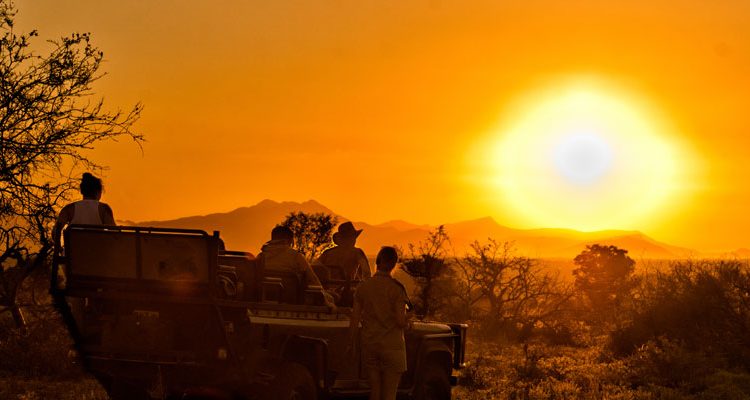
We are big fans of great safari guides and recognise that the quality of your guide can make or break a safari holiday. When we got the chance to ask safari guide trainer Ben Coley to answer ten questions we leapt at the chance.
Q1: How did you end up in the field guiding industry?
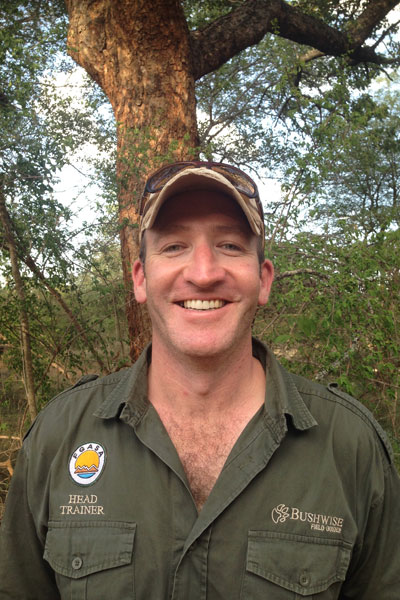
Ben Coley Head Trainer Bushwise
A guest once summed this up better than I could. They said I was born with ‘Africa in my veins’. I cannot really explain it but as a child I was fascinated by African wildlife. I have always been interested in nature but there is something primal about African animals and their lives and I knew that I wanted to be a part of it. However, pursuing something like this when growing up in England always seemed like a dream. Fate has an odd way of working however, and at the age of 25 my life changed rather dramatically and I was suddenly free from commitments in the UK and decided to follow my dreams. I found Bushwise on the internet, made some inquiries in September and was on a plane in January for the adventure of a lifetime. For the first six months of 2006 I was submerged in the African wilderness under the expert guidance of the trainers at Bushwise Field Guides. Their knowledge, passion and enthusiasm left me in no doubt that I had made the right decision. From this grounding I was able to go on and enjoy successful stints at lodges in the Sabi Sands, Kwa-Zulu Natal and even Tanzania. Fast forward 12 years and as the head trainer of the institution that allowed me to experience all I have to date, I am hugely grateful to Bushwise and proud of my achievements!
Q2: What do you love most about your job?
Spending time in the bush with anyone, be they guests or students, is a great feeling. There is something raw and exciting about not knowing what you will see around every corner. I have never been a fan of the mundane and tend to prefer to be spontaneous and this is something that the bush can offer. Nothing is set in stone. Nature is in constant flux and thus so should a guide. Learning to read the bush and anticipate its unpredictability is one of my great joys of being out here. Every day is different and the desire to want to go out and see what is going to happen today is a great feeling.
Perhaps the most rewarding part is sharing your passion with other like-minded people. This is best summed up by a simple example. I have been fortunate enough to view sleeping lions on countless occasions and if I was on my own, I would not spend much time with them, but when you have guests or students that have not been afforded the luxuries that Africa has given me over the past decade or so, the reaction is very different. Guiding is about feeding off people’s emotions. Your enthusiasm should inspire your listeners and their excitement is equally important to you. There is a cathartic side to guiding and it almost becomes a drug. For someone who has never seen a lion before, their excitement transfers to you and makes you realise just how fortunate we are to see these amazing things.
Q3: What is the most challenging aspect of your job?
Haha, there are too many to mention. The early mornings, late nights and dealing with people for potentially 18 hours a day are all hard work. But, the fact that I get to see and spend time in the bush makes it all better!
From a training perspective I think the hardest part is making new guides understand the importance of learning about the aspects of the bush that are unfamiliar to them. Everyone wants to see lions and elephants, but few new guides initially grasp the importance of understanding all the other parts of the ecosystem that allow these more ‘famous’ animals exist. If the bedrock was different, different vegetation would grow and thus different animals would proliferate. What I will say is that when students do learn about these other aspects, they invariably become fascinated and this a great pathway for them to follow their own areas of interest in the future.
Q4: What was your most memorable moment as a student?
That was a long time ago now but I think it would have to be my first elephant sighting whilst behind the wheel. We had been searching for a herd for a while and then, as we were driving along a road, the bushes beside me opened up and the massive head of an elephant bull poked through – it was like a scene from Jurassic Park. It was a reality check for me in understanding the responsibilities thrust upon you as a guide: that you are responsible for the safety of those in the vehicle with you and that your decisions are paramount. I turned white as a sheet and my legs were shaking as I had the clutch pedal depressed ready to move if needs be. The Bushwise trainers were hugely supportive, putting me at ease, as we were surrounded by a whole herd only metres from the car. It was my first up close and personal experience with such a magnificent animal and to this day I remember the humbling feeling it gave me. This gave me a great perspective on what connecting people to nature was all about.
Q5: What is your most memorable moment as a trainer?
There is always a feeling of great reward watching students deliver their assessment drives at the end of the course. For many, this would have been their first experience of Africa; yet after a few months they are interpreting the bush like a pro. I am passionate about my job and happily admit to being moved to tears by the occasional student that seems to have really grasped the concept of reconnecting people with nature in a guided experience. Guiding is a powerful tool and when wielded correctly, can have life changing effects on people. This is one reason I am still doing this job after 12 years.
In terms of specifics I remember doing a sleep-out in the reserve with students and giving an astronomy presentation with a laser pointer. The night sky out here is nothing short of spectacular and this has become a special interest of mine over the years. The students were listening intently to some mythology of the constellations when the silence was shattered by the rasping call of a territorial leopard close by. We looked for the tracks but in typical leopard fashion, it was not to be found. Its timing was impeccable and it was the perfect accompaniment to the stars. Iconic Africa at its best!
Q6: How does it feel to have been a field guide for 10 years?
I am very proud to say that I have remained loyal to this industry after more than a decade. Guiding is often a career that is tried by many but pursued by few. I firmly believe that to work for a long time in this industry you must truly love it: working with animals and people! The conditions are not always ideal, but if you have a passion for it, I truly believe it is the most rewarding job you can do.
Q7: Do you specialise in anything specific/which areas are you most interested in?
There are so many fascinating aspects to the bush that specialising is hard. But over the years I have developed a specific passion for both birds and astronomy. My wife calls me a ‘bird nerd’ as it is rare to see me without my binoculars slung around my neck, even in an urban setting. When my binoculars are not trained on a distant feathered friend, they are usually pointed skyward as I lose myself in the infinite possibilities of space and the imagination.
Q8: What’s your choice for the best sundowner while watching the sunset in the wild?
I genuinely believe that the drink itself is irrelevant. The place and the accompanying atmosphere is far more important. There is nothing quite like a spectacular view of the African sun setting below the horizon. If I was forced to pick one, I guess one cannot go wrong with a G&T with ice and a slice. Even as someone that does not often drink, there is something iconic about a cold gin and tonic on a warm African evening. Although as the one driving, we rarely get to share this experience and are generally resigned to a coke or water whilst vicariously enjoying our guests’ drinks.
Q9: What makes Bushwise a good place to train as a field guide?
There are many reasons why Bushwise is a great place to learn the industry.
We have a team of four hugely dedicated and passionate guides that derive immense pleasure from sharing their knowledge with like-minded individuals. Collectively we have over 50 years experience in the bush, working in a variety of different provinces, biomes and countries. Not only that, but the behind the scenes staff all have lodge or guiding experience and thus the backbone of the whole company is held up by a working knowledge and genuine passion for an industry that has deeply affected all of us.
We also have access to an incredible reserve, with two major rivers running through it, that houses almost every species one would hope to view on a safari. The length of course (six months) also gives plenty of time for us as trainers to immerse students in the experience without rushing to meet deadlines. We can take our time and truly enjoy the course, covering a huge variety of topics that a shorter duration just would not allow. The course culminates with a work placement that is a great opportunity for young guides to spread their wings and put into practice all they have learnt in the previous six months. We have a great conversion rate of students being offered full time positions following placements and this has helped to cement our reputation as one of the premier training providers in the country.
What Next?
Ben Coley is Head Trainer at Bushwise in South Africa. They run a number of different safari guides courses from short ‘tasters’ through to longer courses which will lead to a FGASA accreditation.

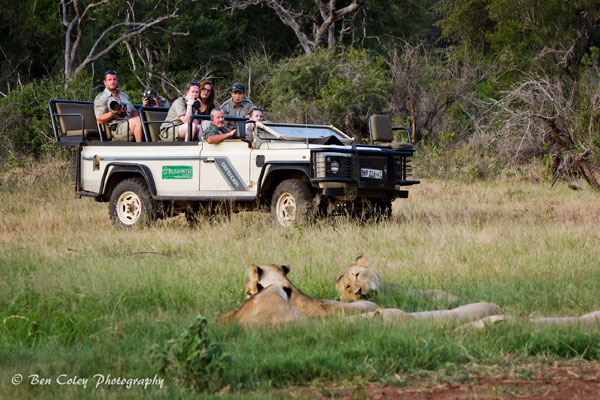
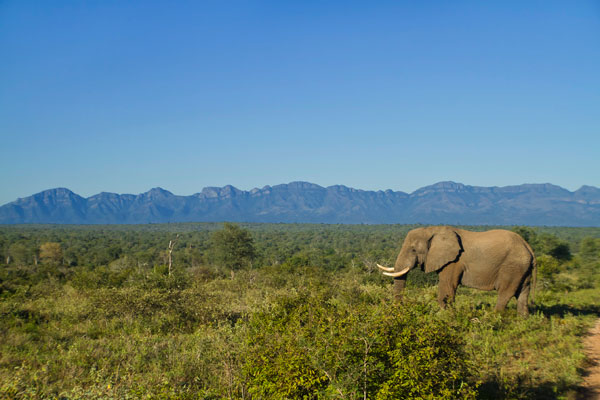
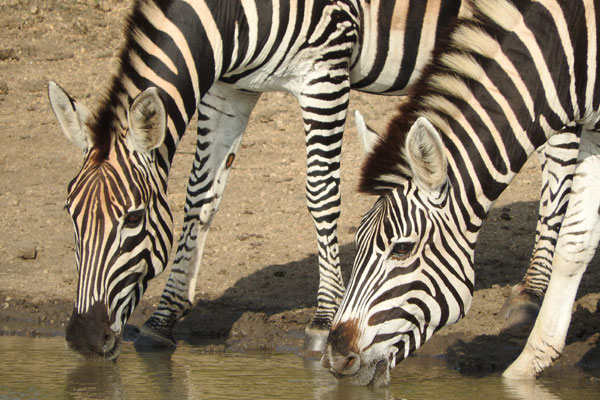
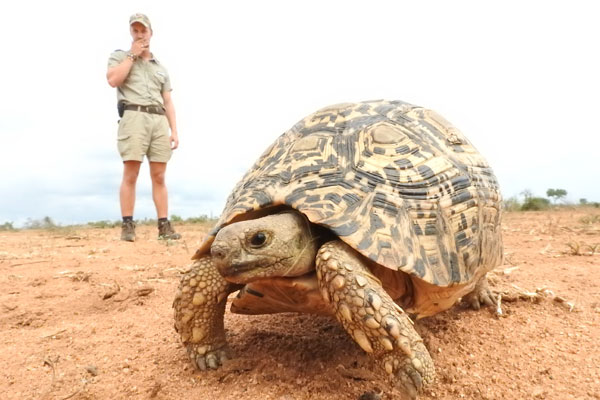
As a proud parent, it is very rewarding to read Ben’s comments and to know that he has fulfilled his dreams after an initial period of uncertainty and soul searching. I hope his developing interest in astronomy will continue to grow and that his life in Africa blossoms.
Hello,
I would like to get in touch with Ben to query how I could please go about using one of his photos.
Dear Basiima – Contact Ben at Bushwise/ Best regards Renate